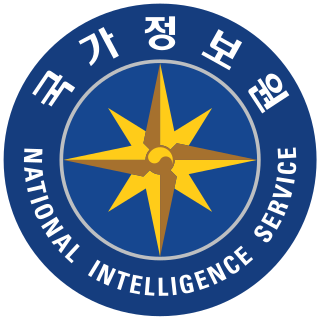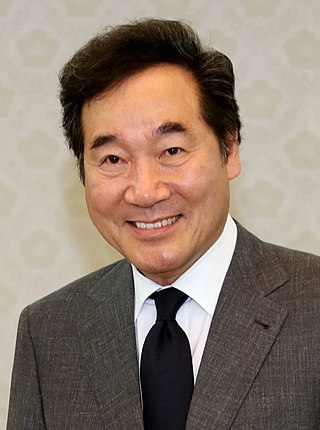The Korean Teachers and Education Workers Union, also known as Jeon(-)gyojo is a labor union of teachers in South Korea. The organization has 77,000 members among the 360,000 public and private school teachers in the country.

The National Intelligence Service is the chief intelligence agency of South Korea. The agency was officially established in 1961 as the Korean Central Intelligence Agency, during the rule of general Park Chung Hee’s military Supreme Council for National Reconstruction, which displaced the Second Republic of Korea. The original duties of the KCIA were to supervise and coordinate both international and domestic intelligence activities and criminal investigations by all government intelligence agencies, including that of the military. The agency’s broad powers allowed it to actively intervene in politics. Agents undergo years of training and checks before they are officially inducted and receive their first assignments.

Park Geun-hye is a South Korean politician who served as the 11th president of South Korea from 2013 to 2017, when she was impeached and convicted on related corruption charges.
Human rights in South Korea are codified in the Constitution of the Republic of Korea, which compiles the legal rights of its citizens. These rights are protected by the Constitution and include amendments and national referendum. These rights have evolved significantly from the days of military dictatorship to the current state as a constitutional democracy with free and fair elections for the presidency and the members of the National Assembly.
Censorship in South Korea is implemented by various laws that were included in the constitution as well as acts passed by the National Assembly over the decades since 1948. These include the National Security Act, whereby the government may limit the expression of ideas that it perceives "praise or incite the activities of anti-state individuals or groups". Censorship was particularly severe during the country's authoritarian era, with freedom of expression being non-existent, which lasted from 1948 to 1993.

Lee Myung-bak often referred to by his initials MB, is a South Korean businessman and former politician who served as 10th president of South Korea from 2008 to 2013. Before his presidency, he was the CEO of Hyundai Engineering and Construction, and the mayor of Seoul from 2002 to 2006.

Internet censorship in South Korea is prevalent, and contains some unique elements such as the blocking of pro-North Korea websites, and to a lesser extent, Japanese websites, which led to it being categorized as "pervasive" in the conflict/security area by OpenNet Initiative. South Korea is also one of the few developed countries where pornography is largely illegal, with the exception of social media websites which are a common source of legal pornography in the country. Any and all material deemed "harmful" or subversive by the state is censored. The country also has a "cyber defamation law", which allow the police to crack down on comments deemed "hateful" without any reports from victims, with citizens being sentenced for such offenses.

The Lee Myung-bak government was the fifth government of the Sixth Republic of South Korea. It took office on 25 February 2008 after Lee Myung-bak's victory in the 2007 presidential elections. Most of the new cabinet was approved by the National Assembly on 29 February. Led by President Lee Myung-bak, it was supported principally by the conservative Saenuri Party, previously known as the Grand National Party. It was also known as Silyong Jeongbu, the "pragmatic government", a name deriving from Lee's campaign slogan.
The 2011 South Korea Blackout was a power outage across South Korea on September 15, 2011.
The DDoS attacks during the October 2011 South Korean by-election were allegedly two separate distributed denial-of-service (DDoS) attacks that occurred on October 26, 2011. The attacks, which took place during the October 2011 Seoul mayoral by-election, targeted the websites of the National Election Commission (NEC) and then-mayoral candidate Park Won-soon. Investigators assert that the attacks were carried out in hopes of suppressing young voters, to the benefit of the Grand National Party. An aide of Grand National Party legislator Choi Gu-sik was found responsible for the attacks.
In the Lee Myung-bak rat poster incident in Seoul, South Korea, university instructor Park Jeong-su (박정수) was indicted by the South Korean authorities for drawing a face of a rat on a promotional poster for the 2010 G-20 Seoul summit. The conservative Lee Myung-bak government was criticized for encouraging institutionalized censorship and abuse of authority, while the Supreme Prosecutors' Office of the Republic of Korea (SPO) was accused of being overly-supportive of the government.

Lee Jung-hee is a South Korean politician, lawyer and activist. She was a member of the 18th National Assembly of South Korea. She was one of the candidates for the 2012 presidential election.
In 2013, there were two major sets of cyberattacks on South Korean targets attributed to elements within North Korea.

The 2012 NIS public opinion manipulation scandal saw members of the National Intelligence Service (NIS) of South Korea accused of interfering in the South Korean presidential election, 2012. First, an agent of the National Intelligence Service (NIS) was alleged to have manipulated public opinion to help Park Geun-hye's presidential election under the command of the NIS. Second, the director of the agency commanded an NIS agent to manipulate public opinion. Suspicions were raised before the election, but were not verified until afterwards.

In August 2013, South Korea's spy agency, the National Intelligence Service (NIS), accused Lee Seok-ki, a lawmaker from the leftist Unified Progressive Party (UPP), of plotting to overthrow the country's government if war broke out with North Korea. He was alleged by NIS to have led a secret meeting in May 2013 of 130 members of his party aimed at attacking South Korean infrastructure if the heightened tensions between Koreas in the spring of 2013 had led to war.

Hwang Kyo-ahn is a South Korean politician and prosecutor who served as acting president of South Korea from 9 December 2016 to 10 May 2017 and the 40th prime minister of South Korea from 18 June 2015 to 11 May 2017.

The impeachment of Park Geun-hye, President of South Korea, was the culmination of a political scandal involving interventions to the presidency from her aide, Choi Soon-sil. The impeachment vote took place on 9 December 2016, with 234 members of the 300-member National Assembly voting in favour of the impeachment and temporary suspension of Park Geun-hye's presidential powers and duties. This exceeded the required two-thirds threshold in the National Assembly and, although the vote was by secret ballot, the results indicated that more than half of the 128 lawmakers in Park's party Saenuri had supported her impeachment. Thus, Hwang Kyo-ahn, then Prime Minister of South Korea, became Acting President while the Constitutional Court of Korea was due to determine whether to accept the impeachment. The court upheld the impeachment in a unanimous 8–0 decision on 10 March 2017, removing Park from office. The regularly scheduled presidential election was advanced to 9 May 2017, and Moon Jae-in, former leader of the Democratic Party, was elected as Park's permanent successor.

Lee Nak-yon, also known as Lee Nak-yeon, is a South Korean politician who served as the 41st Prime Minister of South Korea from 2017 to 2020. A member of the New Reform Party, he is the longest-serving prime minister since the Constitution of South Korea was last revised in 1987. Lee previously held the governorship of South Jeolla Province province from 2014 to 2017, a stronghold of his party. Before serving as governor, he worked as a journalist for over 20 years and served as a member of the National Assembly for four terms.
Deportation of North Koreans by the South Korean Government refers to the involuntary and confidential removal of North Korean defectors by the Government of South Korea in November 2019.

Lee Seok-hyun is a South Korean politician used serving as the executive vice president of National Unification Advisory Council chaired by President Moon Jae-in from September 2021 to August 2022 previously served as Deputy Speaker of the National Assembly and its six-term parliamentarian.









